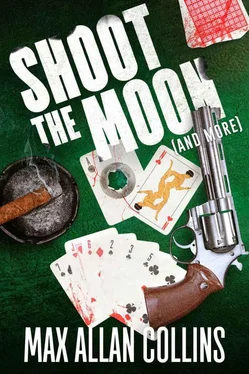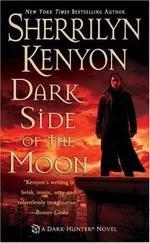What was that supposed to mean?
“I’m waiting for a couple friends,” I said. “They’ll just be a couple minutes. I can move it then, if that’s all right.”
“Suit yourself,” the patrolman shrugged, and walked back to his car and joined his partner.
I had no idea what was going on.
I was still upset about Elam’s last-second revelation that I was sitting in a stolen car, and now, less than a minute later, here was a Highway Patrolman telling me to move that car, but was he really ? I couldn’t tell if he was telling me to move it, or suggesting . And why would a Highway Patrolman want me to move a car parked on the Main Street of Wynning, Iowa, on a Saturday morning, at nine o’clock?
I glanced around, looking for a clue. The street was still deserted. Had the street been cleared for some reason? I had just assumed — we all had just assumed — the street was simply quiet. Wynning was not exactly your teeming Metropolis, after all. The only signs of activity were some teenage kids over on the far side of the park, pitching a big tent, a tent big enough to hold a meeting in.
Was that somehow significant?
I stepped out of the car and took a look at the bank. Because of the raised-up sidewalk I couldn’t see the bank from the car, hadn’t really got any sort of look at it yet at all.
I saw that the venetian blinds on the store-front window of the branch office bank were drawn. I hadn’t noticed whether they’d been drawn when we drove up or not. Maybe Elam and Hopp had drawn them; maybe that was part of their side of the run-through. They hadn’t told Wheat and me any of the stuff that would happen inside the bank; we just assumed they’d go in there, get change for a twenty or cash a check or something, and, you know, just get a general look around at the lay-out of the place and all.
And then I noticed the “Closed” sign hanging in the window of the door. And the shade was pulled on that window, too.
What?
I knew that according to Elam’s instructions I was to sit in the car with the motor running. I knew that Elam had insisted I stay put, and under no circumstances was I to enter or even approach the bank. But something was drastically wrong here.
I leaned back in the car, switched off the motor, and hopped up on the sidewalk.
They’d been inside four minutes.
I looked in the big store-front window, to the side of the venetian blinds, where there was just a crack you could see through to the inside of the bank.
I saw Elam standing in front of the teller counter with a gun in his hand. I saw Hopp behind the counter, standing in the doorway of the open vault, stuffing packets of money into the laundry bag. I saw the tops of the heads of two people, one man, one woman, both of whom were sitting on the floor behind the counter. They were apparently tied up and, I supposed, gagged.
I took two or three dazed steps back away from the window and turned around, head spinning, and said, “That’s a trial run?”
The Highway Patrol officer on the rider’s side looked up at me from his car and said, “Did you want something?”
“NO!” I shouted. And grinned feebly, and repeated, “No.”
By now you must be wondering why these two Highway Patrolmen didn’t find my behavior suspicious. I was wondering that myself. Evidently they thought I was just another nut who got nervous around police types, and let it go at that. Evidently they had other things on their minds.
Meanwhile, I stood there on the sidewalk teetering between the Wynning branch office of the Lone Tree bank and those two unpleasant vehicles, the Highway Patrol car and the stolen Mustang, wondering what to do. Oh, I had options, sure, but when your options revolve around a bank in the process of being robbed, a Highway Patrol car and a stolen Mustang, you find yourself unable to do much of anything, except maybe stand there on the sidewalk, teetering.
I considered just walking away. Hoofing it on out to that burned-out farmhouse where Wheat waited, Wheat and his Volks, Wheat and his beautiful, not stolen Volkswagen. It wouldn’t be like I’d driven off and left Elam and Hopp behind. If I left the key in the Mustang’s ignition, it wouldn’t be like I’d left Elam and Hopp in the lurch.
Would it?
But suppose I did walk away. Elam and Hopp would come out of the bank with a bag of money in one hand and a gun in the other, and there could maybe be shooting, and did I want to be responsible for that? That would be like seeing an accident coming and not yelling “Look out!”
Furthermore, Elam and Hopp, teed off at me for deserting them, would probably immediately tell the patrolmen where to find Wheat and me.
I considered going over and telling the patrolmen what was happening inside that bank, but how could I? I was in this up to here. I was an accessory to a bank robbery, and still would be, even if I helped stop it mid-stream.
And suppose I did tell the patrolmen: there was liable to be shooting that way, too.
See what I mean about the options at hand? Did you ever see such a bunch of lousy damn options in your life?
Then it occurred to me that if I was not going to leave, if I was not going to turn my back on the bank and walk away, I at least had to warn Elam and Hopp. I had to tell them not to come out of there with that bag of money slung casually over their shoulders.
So, with what I hoped was a nonchalant air, I walked back over and tried the door to the bank.
Locked.
Well. That was no surprise.
I knocked. Softly. Not wanting to unduly disturb the patrolmen sitting drowsily in their vehicle nearby.
No answer.
That was no surprise, either.
I kept at it. I knocked a bit louder. Just a bit.
And finally Elam’s voice, in a friendly tone, said, “I’m sorry, we’re closed this morning.”
“It’s me,” I said.
Elam cracked the door open.
“Take a look out front,” I whispered.
Elam looked. There was an almost imperceptible tightening around his eyes, but that was all. He did not blow. He was too professional for that, I guess.
“All right, kid. Turn around and face the street. Fine. Now lean against the building there. Good. I’m going to leave this door cracked open just a shade so I can keep talking to you. I’m gonna have to keep it low, kid, can ya hear me okay?”
“Yes.”
“Cover your mouth with your hand when you talk. Like you was yawning or coughing or something.”
I nodded.
There was a pause, and he said, “I guess you know what we’re doing in here.”
“Yes.”
“Thanks for sticking around.”
“Go to hell.”
“I know how you must feel, kid. When you get a chance, think of it from our point of view and maybe you’ll understand. For right now just hang loose a second and leave me think about this. Well. We obviously can’t come sashshaying out of here with a bag of money over our arm, can we? So okay. We wait it out a while. We wait and see if the Highway Patrol is staying around for something, or just making a short stop to kill some time. If things stay the same for longer than fifteen minutes, knock on the door again, and I’ll tell ya where we go from there. Got that, kid?”
“Listen, I’m leaving. The key’ll be in the ignition. I’m going to walk out and join Wheat at that farm and get out of here. You can’t say I ran out on you, ’cause I came up and warned you.”
“Kid. Stick around.”
I heard the door close.
And then the concession wagon rolled in. I was still standing on the sidewalk, just getting ready to get back in the Mustang and “stick around,” like Elam suggested, when this dinosaur of a camper came rumbling down the street. The camper was white, but it was garishly painted with red, yellow and blue lettering that said, “El Tacomobile.”
Читать дальше












